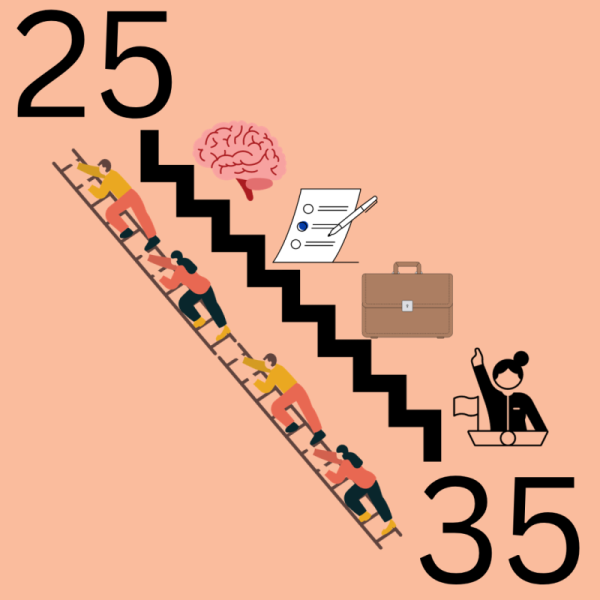“No Person except a natural born Citizen, or a Citizen of the United States, at the time of the Adoption of this Constitution, shall be eligible to the Office of President; neither shall any Person be eligible to that Office who shall not have attained to the Age of thirty five Years, and been fourteen Years a Resident within the United States” the Constitution of the United States of America states.
These words, put onto paper by the writers of the constitution, make it clear that the minimum age requirement for assuming office in the United States is 35 years, not a day younger. And, according to the Library of Congress, “Legal requirements for presidential candidates have remained the same since the year Washington accepted the presidency.”
Yes, that’s right, the minimum age requirement has stayed the same for 245 years, or since 1788. For context, in between the years 1788 and 2023, the United States invented the telephone, the digital computer, and the incandescent light bulb, created and dropped two atomic bombs on Nagasaki and Hiroshima, Japan, landed on the moon, and fought in two world wars, to name a few important events.
In all this time of change, growth, disaster, and innovation, the minimum age for assuming the presidency has stayed the same.
This leads to an important question: if a human’s brain stops developing in their 20’s, why are presidential candidates still required to be 35 years or older? James Madison, the fourth president of the United States, provided some insight to this dilemma in The Federalist 62nd (the 62nd essay in The Federalist Papers), when he discussed some points that led to the age requirement, writing about the importance of “greater extent of information and stability of character,” adding that the president “should have reached a period of life most likely to supply these advantages (in this case, 35).”
Tench Coxe, a continental congress member who did not participate as a delegate in the Constitutional Convention, was much more clear with his views, writing “In America, as the President… cannot be an idiot, probably not a knave or a tyrant, for those whom nature makes so, discover it before the age of thirty-five, until which period he cannot be elected.”
Despite these strong views, it is somewhat ironic to note that 12 of the delegates at the Constitutional Convention were under the age of 35, including Alexander Hamilton. Additionally, Thomas Jefferson was also 33 years of age when he drafted the Declaration of Independence in 1776, making it clear that there were in fact citizens of the United States under the age of 35 who were capable of handling important positions (such as president), and still are.
Consider this: Greta Thunberg, who has become one of the leading climate activists in the world, is just 20 years old. By the constitution’s standards, (putting aside the fact that Thunberg was born and lives in Sweden) she is not mature or capable enough to assume office purely based on her age. One wonders what Thunberg would make of that.
In terms of the logic behind the minimum age required for assuming office, a lack of maturity and ability are the main concerns. However, as already established, young people can be incredibly successful in positions of high importance, so the issue of ability is not as big of a deal as it is made to seem (especially since, as previously stated, many of the people who established this rule were in fact under 35).
It is clear that, at least according to politicians like Coxe, the big concern lies with maturity. However, if you look at the science of the brain, these claims start to unravel.
New knowledge has emerged fairly recently that points to the development of the encephalon (brain) finishing in a human’s mid-to-late twenties, according to the National Institute of Mental Health. Additionally, The National Institute of Health cites brain development as finishing even earlier, stating, “The development and maturation of the prefrontal cortex occurs primarily during adolescence and is fully accomplished at the age of 25 years.”
With this research, it is evident that the brain of the common human, an organ almost single-handedly responsible for every decision people make, is fully developed around the age of 25. And yet the minimum age requirement for becoming president is 35, a ten year difference.
Despite the science behind brain development, the age limits set on the presidency haven’t successfully been challenged in court. This doesn’t mean it hasn’t been attempted, though; in 2012, 28 year old Peta Lindsay openly challenged the presidential age restriction by running as a presidential candidate for the Party for Socialism and Liberation.
While the PSL (Party for Socialism and Liberation) isn’t close to the Democratic or Republican parties in terms of stature or popularity, their 2012 endorsement of Lindsay as their presidential candidate still speaks to the qualification and ability of potential presidential candidates under 35; the PSL is still a political party capable of putting candidates (such as Lindsay) on the ballot in national elections.
However, despite Lindsay’s attempt to run for president, the National Constitution Center details how, “In 2014, Federal appeals Judge Alex Kozinski and two other federal judges rejected arguments that Lindsay’s rights were violated under the First Amendment and the 14th Amendment’s Equal Protection Clause and that the 12th Amendment’s language didn’t allow states to set age requirements.”
Additionally, former Judge Kozinski, since retired, stated, “Holding that [the state] couldn’t exclude Lindsay from the ballot, despite her admission that she was underage, would mean that anyone, regardless of age, citizenship or any other constitutional ineligibility would be entitled to clutter and confuse our electoral ballot. Nothing in the First Amendment compels such an absurd result.”
In terms of Judge Kozinski’s statement, a couple of things need to be pointed out. First of all, changing the language of the constitution isn’t all or nothing; the information detailing age requirements could be (key word) amended while the information regarding being a natural born citizen and living in the United States for a minimum of 14 years could stay the same.
On top of the inaccuracy of Judge Kozinski’s statement, he is also a prime example of older not necessarily being better; in 2017, the 67 year old judge abruptly retired after allegations of sexual harassment and misconduct were brought against him.
With all that being said, are 25 year olds experienced enough to run for office? The average person will hold an average of 5.7 jobs between 18 and 24, showing that they are capable of handling work.
While critics may argue that this many jobs signifies that young adults lack the ability to hold down work, one must also consider that many of these people are attending college and haven’t found a full-time career yet. Additionally, there is something to be said about the general ability (or at least charisma, an important presidential quality) of a person who can apply for and be accepted to 6 jobs in 6 years.
Furthermore, while the presidency is obviously a huge responsibility, the experience gained from working jobs, whether it is at a McDonalds or a law office, holds high importance. Getting real-world training in practical fields cannot and should not be undervalued, especially in such a key time of personal development.
The last point that has to be made is that lowering the minimum age requirement for president will not necessarily result in an increase in younger candidates; the average age for assuming president is currently 55, a difference of 20 years when compared to the current requirement. The last two presidents of the United States have been the oldest ever, with former president Donald Trump being inaugurated at 70 years old and current president Joe Biden assuming office at 78.
On the other side of the spectrum, John Kennedy remains the youngest president ever to assume office at 43 years, but even he represents an 8 year difference. Through these statistics, it becomes clear that presidential candidates are rarely in the first half of their life when they run for office, meaning a change in the age requirement is needed to shake things up, even if it does not prove as effective as hoped.
A need for change is again highlighted by the increasing disconnect in recent years between young voters and presidential candidates, mainly due to a difference in age and beliefs. This gap will continue to discourage young adults from participating in elections and truly using their vote to represent what matters to them, and without the voice of this important demographic in politics, the United States will continue to be hindered in attempts to move forward as a nation.
An underlying theme that the United States has always been defined by is a willingness to change, grow, and take action; as Benjamin Franklin once said, “Without continual growth and progress, such words as improvement, achievement, and success have no meaning.” With this being said, the constitution should strive to embody the beliefs of change and progress that were imparted from the minds of our founding fathers into the very core of American society. That is exactly what this amendment would hope to accomplish.




Anonymous • Dec 15, 2023 at 2:09 pm
I’m not sure that 25 is appropriate, either. That’s about 7 years removed from high school, and only 3 from finishing a full 4-year college program. I agree that the minimum age requirement should be LOWERED, but perhaps not quite as drastically. 27, maybe, or 30. Even though a 25-year-old is fully developed, they’re still very young. I think that there’s a point in that they should have some more life experience. Very, very well-written article though!